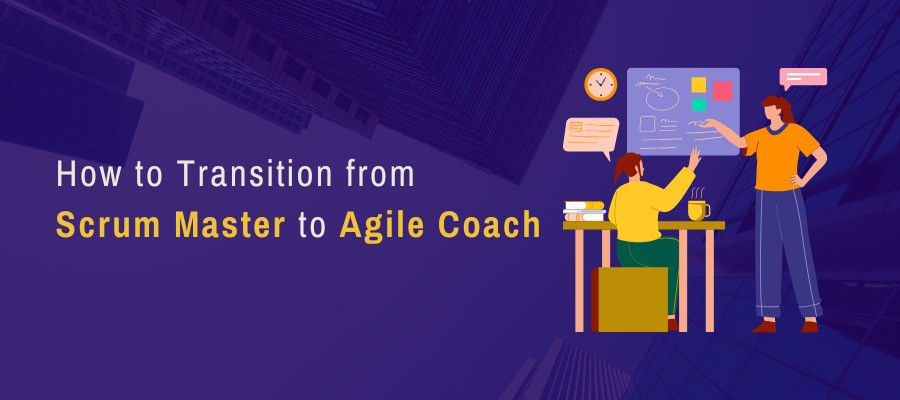How to Transition from Scrum Master to Agile Coach

Stepping into the role of an Agile Coach from being a Scrum Master is not a simple title upgrade. It's a meaningful shift in mindset, scope, and skill set. While Scrum Masters focus primarily on teams and frameworks like Scrum, Agile Coaches operate at a broader level. They guide teams, departments, and even entire organizations to achieve agility. This transition requires deepening your existing skills and evolving your approach to facilitation, coaching, mentoring, and leadership. Let’s break down what it takes to make this transition effective.
Start with a Strong Foundation in Facilitation
Facilitation is one of the most underrated yet essential skills for any aspiring Agile Coach. According to Sam Kaner, a facilitator enables groups to work more effectively while staying neutral. For a Scrum Master, this begins with guiding retrospectives, sprint planning, and daily stand-ups. Over time, you must expand your facilitation abilities beyond team-level ceremonies. You must lead executive alignment workshops, value stream mapping sessions, and cross-functional problem-solving conversations. Mastering facilitation helps you influence without authority and bring clarity during ambiguity. It is vital to coaching at the organizational level.
Broaden Your Horizons Beyond Scrum
One of the first realizations when transitioning from Scrum Master to Agile Coach is that agility is not limited to Scrum. Scrum is just one framework under the Agile umbrella. Agile Coaches must be well-versed in various frameworks and practices such as Kanban, SAFe, LeSS, Disciplined Agile, and XP. This wider knowledge allows you to support diverse teams working under different constraints. More importantly, it enables you to tailor Agile practices to the organizational context, which is the essence of being a coach. You should also build literacy in Lean thinking, systems thinking, and DevOps to truly operate at the intersection of delivery and improvement.
Embrace a Coaching Mindset
Coaching is not the same as advising. It’s a shift from telling people what to do to helping them discover solutions. This is a challenging but crucial transition for a Scrum Master, who may be used to giving guidance. Coaching, especially in Agile, involves partnering with individuals and teams in a thought-provoking process to unlock their potential. You are not there to solve the problem but to ask the right questions, provoke reflection, and help them find their path. Learning the 8 Coaching Stances—such as teaching, mentoring, facilitating, and professional coaching—will help you choose the right approach based on the situation and maturity of the team.
Develop Mentoring Skills Alongside Coaching
While coaching emphasizes discovery, mentoring focuses on sharing experiences. As you grow, you’ll often find yourself in situations where someone needs guidance based on what you’ve seen work. Unlike coaching, mentoring involves stepping in to share your insights and offering options, especially when someone is stuck. Agile Coaches need mentoring and coaching abilities and must know when to switch between them. This dual capability makes you versatile and relevant to new Agile practitioners and senior leaders navigating complex transformations.
Make Peace with Not Knowing Everything
This is a subtle but critical internal shift. Scrum Masters often feel pressured to have all the answers, especially in high-performing teams. Agile Coaches, on the other hand, operate in volatile, uncertain, and frequently ambiguous spaces. You may not have the answers, and that’s okay. Your value lies in guiding others to find clarity amid chaos. Your tools are cultivating curiosity, asking open-ended questions, and becoming comfortable with experimentation. Rather than fearing the unknown, embrace it as the space for fundamental transformation.
Practice, Reflect, Evolve
Becoming an Agile Coach is not a one-time certification or title change. It is an ongoing practice. Like any craft, you improve through repetition, reflection, and feedback. Start by journaling after each coaching session. What went well? What could be better? Seek feedback from your peers, mentees, and coachees. Attend communities of practice and coaching circles to share experiences. As you evolve, you’ll develop your unique coaching style.
Coach the System, Not Just the Team
A Scrum Master often works at the team level, helping them follow Agile practices and remove impediments. However, Agile Coaches must zoom out to see the entire system—organizational culture, leadership behaviors, funding models, metrics, and team dynamics. You must identify systemic issues hindering agility and guide organizations toward a more enabling structure. This involves understanding governance, portfolio planning, and even HR practices. The shift from team-level optimization to system-level coaching truly defines the move to an Agile Coach role.
Grow Agile Coaches by Empowering Scrum Masters
One of the most effective ways to scale Agile coaching within an organization is to help Scrum Masters evolve. As an Agile Coach, you support teams and mentor other Scrum Masters. This creates a multiplier effect and helps foster a coaching culture across the organization. Empowering Scrum Masters to step up as team coaches is one of your most significant responsibilities as you transition into a more strategic and organization-wide role.
When Do You Know You're Ready to Be an Agile Coach?
No checklist officially qualifies you to become an Agile Coach. However, you might be ready when:
- You feel confident coaching leaders, not just teams.
- You can comfortably switch between mentoring, coaching, training, and facilitating.
- You’ve practiced Agile in multiple contexts across regulated industries.
- You prioritize impact over process and metrics over rituals.
- You are no longer attached to a single framework or method.
If you find yourself in this space, it might be time to step forward into coaching.
How PremierAgile Can Help You Make This Transition
PremierAgile is more than just a training platform. It’s a transformational partner for Scrum Masters aiming to become world-class Agile Coaches. Through its thoughtfully designed programs, PremierAgile equips you with the tools, techniques, and real-world insights needed to grow beyond frameworks. You'll get access to coaching stances, facilitation skills, system-level thinking, and mentoring strategies through workshops and certified courses.
More importantly, PremierAgile's approach is deeply experiential. You won’t just sit through PowerPoint slides. You’ll engage in participatory learning, simulations, case studies, and community mentoring. If you're looking for an edge, their Scrum Alliance-aligned Agile Coach certifications help you earn globally respected credentials while building practical coaching capabilities.
From enabling facilitation mastery to helping you navigate real-world transformation scenarios, PremierAgile is the ideal launchpad for your next career move. Whether you're just beginning to explore coaching or ready to take on enterprise-level challenges, PremierAgile helps you build the mindset and mastery to thrive as an Agile Coach.
Reference:
https://www.linkedin.com/pulse/from-scrum-master-agile-coach-roadmap-career-progression-madhurai-das-bvgvc/




